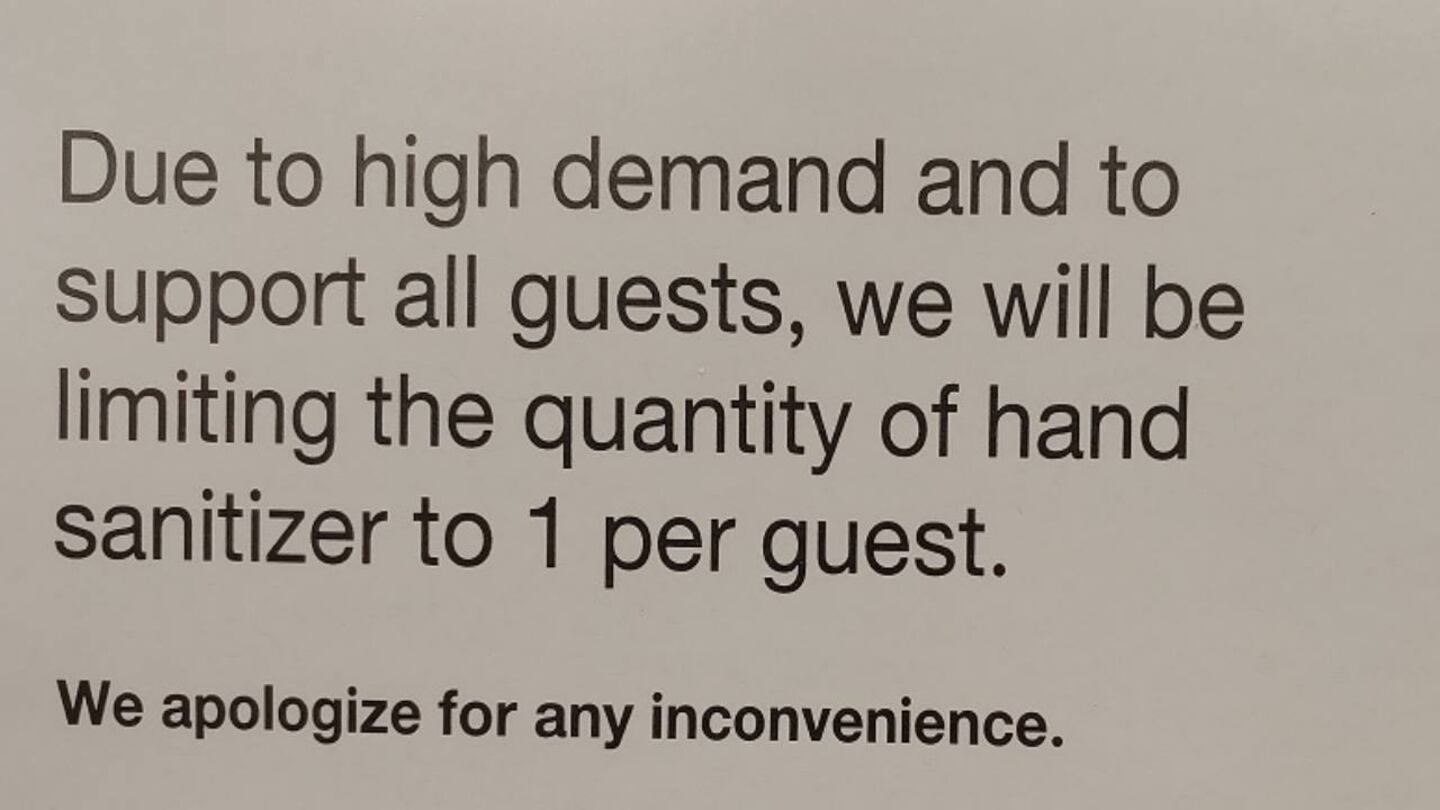CHATTANOOGA, Tenn. — A Tennessee man’s idea of collecting 17,700 bottles of hand sanitizer and then selling them online turned out to be a washout. Now, he is making a clean break, donating them so to people in need can receive the supplies.
Matt Colvin, an Amazon seller from Chattanooga, Tennessee, donated two-thirds of the supplies Sunday to an area church, just as the Tennessee Attorney General’s Office began investigating him for alleged price gouging, The New York Times reported.
Colvin helped church volunteers load the sanitizers and antibacterial wipes into a truck. Officials from the attorney general’s office took the rest of the items and plan to give them to the Kentucky Attorney General’s Office since Colvin bought some of the products in that state, the newspaper reported.
>> Can’t find hand sanitizer? Here’s how to make your own
The church plans to distribute the products to first responders, including the Chattanooga Police Department, Hamilton County Sheriff’s Office and Chattanooga Fire Department, the Chattanooga Times Free Press reported.
After the NYT article about Matt Colvin — guy who amassed 17k+ bottles of hand sanitizer — the Tennessee AG shut him down & has been going to his storage units to facilitate the "donation" of the items to local community groups and first responders. 👏🏼👏🏼👏🏼pic.twitter.com/RuHIt3F39F
— Minh Ngo (@minhtngo) March 15, 2020
Church officials wanted to remain anonymous, Colvin said.
“They’re worried about the backlash,” Colvin told the newspaper. “I don’t blame them.”
Colvin and his brothers had gone to stores in rural areas of Tennessee and Kentucky, cleaning out stores of sanitizers and wipes in an effort to profit off the COVID-19 panic, the Times reported.
Colvin marked up 300 of the bottles and sold them on Amazon for between $8 and $70 apiece, telling the Times it was “crazy money."
Matt Colvin in Hixson, TN bought 18,000 bottles of sanitizer before the shortage surrounding COVID-19.
— Hunter Hoagland (@HunterHoagland) March 14, 2020
He admits to cleaning out stores in multiple states— intending to sell for profit on Amazon.
Amazon took down his listings— he says he is considering donating. @WRCB pic.twitter.com/hfg8j0u43g
However, on March 5 the company removed Colvin’s listings. EBay followed suit, and Colvin suddenly was sitting on top of a massive amount of inventory. He also found himself the target of internet scorn and even some death threats, the Times Free Press reported.
One email he shared with the Times said, “Your behavior is probably going to end up with someone killing you and your wife and your children.”
“At the end of the day, I’m sorry I bought all this stuff, not just because of how it’s affected me but because of how things have changed since I bought it,” Colvin told the newspaper Sunday. “I know I’m splitting hairs here, but I wasn’t selling this stuff after March 5. If I had known how things would be now, I wouldn’t have touched any of this. There’s no way.”
>> 7-Eleven owner in NJ arrested after selling homemade sanitizer that burned 4 children
Meanwhile, an investigation of Colvin and his 21-year-old brother, Noah Colvin, is ongoing, according to a release from the Tennessee attorney general.
“We will not tolerate price gouging in this time of exceptional need, and we will take aggressive action to stop it,” Attorney General Herbert H. Slatery III’s office said in a statement. “During this pandemic, we ask that you report suspicious activity to the Division of Consumer Affairs and refrain from threatening or hostile communication with individuals or businesses you may suspect are price gouging.”
This is Matt Colvin of Chattanooga who thought it was a good idea to let @nytimes publish his name and picture in a story about how he helped create a shortage for the rest of America trying to profit off a pandemic.
— Amee Vanderpool (@girlsreallyrule) March 14, 2020
Matty needs to hold a yard sale ASAP. https://t.co/rcUVecujGG
Under Tennessee law, the attorney general’s office can stop price gouging and seek refunds for consumers, the Times Free Press reported. The courts can also impose penalties up to $1,000 per violation, the newspaper reported.
Donating the items may not prevent prosecution against the Colvin brothers, WRCB reported.
“I just want to make clear that donating the sanitizers does not mean they are off the hook legally," Samantha Fisher, a spokeswoman for the Tennessee Attorney General’s Office, told the television station. “If evidence establishes they engaged in price gouging we will seek appropriate penalties.”
“I just want to make clear that donating the sanitizers does not mean they are off the hook legally. If evidence establishes they engaged in price gouging we will seek appropriate penalties.”- Samantha Fisher, Director of Communications,
— Hunter Hoagland (@HunterHoagland) March 15, 2020
Tennessee Attorney General. @WRCB https://t.co/OWXFpXvSsU
“It was never my intention to keep necessary medical supplies out of the hands of people who needed them,” Colvin told the Times “That’s not who I am as a person. And all I’ve been told for the last 48 hours is how much of that person I am.”
Cox Media Group





